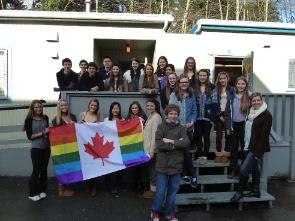Eight years after the BC Court of Appeal ordered North Vancouver to address homophobia proactively in its schools, some teachers and students are still unaware of the policy the district passed.
Andrea Yeo learned that North Vancouver has an anti-homophobia policy at the Dare to Stand Out conference Jan 21. Yeo is the teacher sponsor of Seycove Secondary’s gay-straight alliance (GSA).
GSA member Anna Zapalowska, who is in Grade 11, was not aware that the district has an anti-homophobia policy either.
“It was surprising,” she says. “I was relieved and glad, because it would just be awful if they didn’t have a policy about that.”
The 2006 policy states in part that the North Vancouver School District, through ongoing educational initiatives, is “committed to raising awareness and improving the understanding of the lives of people who are identified as gay, lesbian, bisexual, transgender or who are questioning their sexual orientation or gender identity.”
The court ordered North Vancouver to address homophobia proactively after finding it responsible for the anti-gay harassment Azmi Jubran endured throughout his high school years in the district.
Zapalowska and the Seycove GSA now plan to highlight the policy at a school assembly in February. It will be the first time that the GSA will spearhead an assembly on queer issues.
While attitudes toward queer people at Seycove are better than at a lot of schools she has visited, Zapalowska says there’s still stigma.
“People are like, ‘Is there anyone even gay at Seycove?’” she says.
Queer issues are only occasionally brought up in class, she says. “The conversations aren’t nearly as open as they are here at the GSA meetings,” she adds.
Zapalowska would like the district to address homosexuality more proactively to “make it more normal.” She can only recall three school assemblies on queer issues in the years she’s attended Seycove.
GSA member Nicole Forth also learned about her district’s anti-homophobia policy at the Dare to Stand Out conference. So did Jenna Hewitt-Kenda, who joined the GSA toward the end of last year.
“Teachers like Ms Yeo have been working against homophobia for so long,” Hewitt-Kenda says. “We have posters all over the school saying, ‘That’s so gay is so yesterday,’ but I’m hoping this school assembly will really help with all this.”
“That’s something that we’ll have to work on,” says Brad Baker, North Vancouver’s Safe and Caring Schools administrator, when informed that some students weren’t aware of the district’s anti-homophobia policy.
“You look at Seycove, they’re one of the strongest schools,” Baker says, pointing to the GSA’s upcoming assembly.
Hewitt-Kenda thinks the district should address the ongoing problem of anti-gay slurs in its schools.
“I think it’s important for [the district] to recognize it, because if it’s never brought up, it’s going to keep happening,” she says.
“We’ve discussed it in this group, and there are things we can do, but there’s a lot of things we have no control over,” she continues. “We can’t make it punishable in all the schools.”
Baker believes that students are aware of the anti-homophobia policy and that it is well communicated. It’s accessible to all on the district’s main website, he points out.
It’s also mentioned in school assemblies that highlight all the district’s policies at the beginning of each school year, he says, and some schools organize Pride week celebrations and have GSAs. “We have active participation in four out of the six schools that work with the community around the gay-straight alliance clubs that bring in people.”
Handsworth Secondary teacher Mary Klausen was a GSA teacher sponsor for three years but tells Xtra by email that interest in the group waned after a “very active student ally” left the school. “This is the second year that no one has taken up the cause to lead this in our school,” she says.
Asked how the district actively educates students and staff about its anti-homophobia policy, Baker points to the Social Justice 12 elective course, which features guest speakers on queer issues.
Asked if the district attempts to integrate queer issues into its mandatory curriculum, Baker says they are part of Planning 10, but he’s not sure if they’re integrated into other classes.
“We’d like to infuse things like this into all our mainstream curriculum,” he adds, noting that there are some individual teachers that make that effort.
Forth confirms that queer issues are raised in Planning 10, Health and Career, and in the Social Justice 12 elective if students decide to enroll in that class, but “that’s really it,” she says.
“That’s actually a good question,” North Vancouver Teachers’ Association president Daniel Storms replies, when asked how the district creates awareness about its anti-homophobia policy. “I’m not entirely clear how they do that.”
“Given that I don’t know, it’s probably not as well publicized as it probably could be,” he says.
There is a social-justice group within the teachers’ association that organizes activities with “lots of social-justice-like things,” he notes, but “whether they’re particularly tailored on occasion to gay, lesbian and transgender issues, that’s based on whatever the focus of the particular day or theme of the year.”
Storms believes education around queer issues is done at the school level. “It’s probably more, ‘Here’s the broader school district policies, and this is one of several,’ and have schools implement those initiatives.”
Asked if his association has had any direction from the district about initiatives dedicated to queer issues, Storms says that hasn’t happened yet this year, nor did it occur last year.
“I think the support for LGBT youth is good in the district, but I think it could be more overt than it is,” he says. “I think there’s obviously room for improvement.”


 Why you can trust Xtra
Why you can trust Xtra


